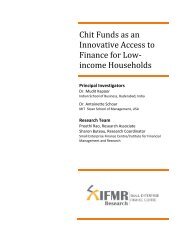Government of India Volume I: Analysis and Recommendations
Government of India Volume I: Analysis and Recommendations
Government of India Volume I: Analysis and Recommendations
Create successful ePaper yourself
Turn your PDF publications into a flip-book with our unique Google optimized e-Paper software.
FOUNDATIONS OF CONTRACTS AND PROPERTY<br />
3. It will require sellers <strong>of</strong> securities to provide adequate information about the securities being sold<br />
<strong>and</strong> the terms <strong>and</strong> conditions <strong>of</strong> the security to retail consumers.<br />
13.4.3. Systemic risk<br />
Infrastructure Institutions are usually systemically important financial institutions. Their<br />
failure has negative consequence on the entire financial system due to the connection<br />
services they provide between financial service providers. The rules made by Infrastructure<br />
Institutions must thus pursue high levels <strong>of</strong> safety, <strong>and</strong> regulators must monitor such<br />
institutions from this perspective.<br />
13.4.4. Monopoly abuse<br />
Contracting has taken place for millennia without the intervention <strong>of</strong> these Infrastructure<br />
Institutions. The economic purpose <strong>of</strong> such institutions may be classified into two parts.<br />
The first is that <strong>of</strong> reduced cost in contracting. The search cost for a counterparty goes<br />
down by going to an exchange. St<strong>and</strong>ardisation <strong>of</strong> processes is essential for the use <strong>of</strong><br />
electronics in securities trading, settlement, <strong>and</strong> payments.<br />
The market power that Infrastructure Institutions enjoy are amenable to abuse. This<br />
may arise in areas like refusing to list securities, preventing access to connections or preventing<br />
access on neutral terms. Hence the regulator has to monitor the terms on which<br />
the Infrastructure Institution operates. An essential element <strong>of</strong> this is the requirement<br />
that all Infrastructure Institutions operate on predetermined rules which are approved by<br />
the regulator so that there is no arbitrary treatment <strong>of</strong> any party accessing the services.<br />
13.4.5. Information as a public good<br />
The information produced by Infrastructure Institutions has wide ramifications for the<br />
market economy. The prices <strong>of</strong> securities are utilised by the wider economy as a vital<br />
input for making decisions about resource allocation. Hence, Infrastructure Institutions<br />
should be required to release high quality information that will support such applications.<br />
13.4.6. Market abuse supervision<br />
Information produced by Infrastructure Institutions is vital to the functioning <strong>of</strong> the financial<br />
system. It is also an input into decision making across the economy. When this information<br />
is incorrect, it reduces the quality <strong>of</strong> decision-making across the economy, <strong>of</strong>ten<br />
involving persons who are not direct participants in the financial markets. Hence, regulators<br />
<strong>and</strong> Infrastructure Institutions must undertake initiatives that ensure the integrity<br />
<strong>of</strong> this information. This requires blocking market abuse.<br />
Further, Infrastructure Institutions are at the front-line <strong>of</strong> supervision on the problems<br />
<strong>of</strong> market abuse. While the prime responsibility for enforcement against market abuse<br />
lies with regulators, the front-line tasks <strong>of</strong> watching markets <strong>and</strong> conducting the early<br />
stages <strong>of</strong> an investigation lie with Infrastructure Institutions. In the modern environment<br />
with high-speed computerised trading <strong>and</strong> complex trading strategies, Infrastructure Institutions<br />
are required to build sophisticated supervisory staff <strong>of</strong> a kind that is not easily<br />
assembled in governmental agencies.<br />
Product development at Infrastructure Institutions will <strong>of</strong>ten lead to innovative new<br />
products being developed. While this is desirable, such institutions will also be required<br />
to build the commensurate supervisory capacity to underst<strong>and</strong> <strong>and</strong> detect abuse in tracking<br />
billions <strong>of</strong> transactions in fast-paced information technology systems. The regulatory<br />
124 FINANCIAL SECTOR LEGISLATIVE REFORMS COMMISSION



